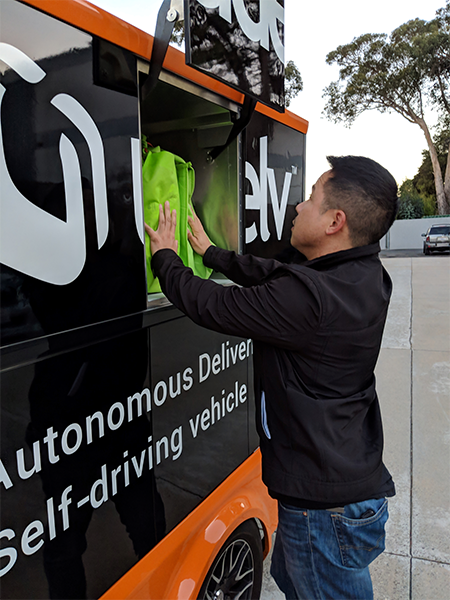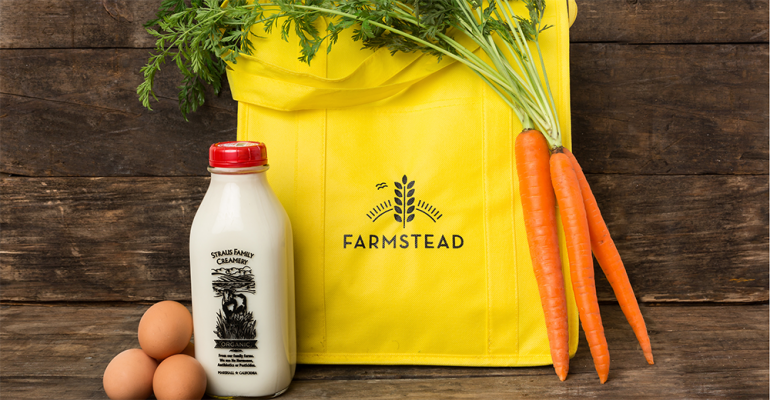Online grocer Farmstead is taking a more environmentally friendly approach to delivery.
The San Francisco-based food retailer on Tuesday launched its Sustainable Routes program, aimed at reducing the number of vehicles on the road and, in turn, carbon emissions and the company’s delivery costs.
 Farmstead launched deliveries through Udelv self-driving vans last fall.
Farmstead launched deliveries through Udelv self-driving vans last fall.
Sustainable Routes works by making grocery deliveries more efficient. Farmstead groups neighbors who receive their online grocery orders during the same day and time window each week, allowing deliveries to be made to more customers with fewer vehicles. Under the program, customers can choose from three delivery windows daily, seven days a week.
Farmstead estimates that Sustainable Routes will pull nine or 10 unnecessary vehicles off the road for each delivery route that leaves its fulfillment micro hub. The grocer said the savings enables it to provide customers free delivery as well as lower prices. For example, as a neighborhood’s route becomes more sustainable, the retailer will offer those customers benefits such as exclusive product discounts and reduced order minimums.
“We are committed to making fresh, high-quality groceries accessible to all, while doing our part to make environmentally sound business decisions,” Pradeep Elankumaran, co-founder and CEO of Farmstead, said in a statement. “This is one of several steps Farmstead is taking to reduce our carbon footprint and lower last-mile delivery costs, and we are proud to work directly with our customers on initiatives to preserve the planet.”
Farmstead also is giving customers an incentive to make their route more sustainable. For each friend or neighbor they get to sign up with the online grocer, current customers receive a $20 credit, while the first-time customers get $15 off their initial order of more than $30 and then $20 off their second order.
The Bay Area grocer noted that it has sought to promote sustainable practices since its launch in 2016. For instance, the company said that from day one it has picked up and reused delivery bags and ice packs, while also taking back customers’ milk bottles back. And recently, the retailer switched to compostable produce bags for delivering its locally sourced fruit and vegetables.
Earlier this month, Farmstead expanded its Refill & Save online ordering program to more than 300 staple grocery items, up from the initial 25 items when the service was launched at the end of January. Refill & Save offers customers with recurring orders of certain staple products — including milk, eggs, fresh fruit and vegetables, and bread — discounts that bring the prices of those items down to below-average cost for the Bay Area, according to Farmstead. The retailer also lowered its weekly order minimum for Refill & Save to $20.
For its online business model, Farmstead leverages artificial intelligence-powered predictive analytics to help predict demand and supply more accurately, which the company said enables it to deliver orders of “fresher-than-the-usual local products” in less than an hour and minimize food waste.
Farmstead in December announced $2.2 million in new venture funding and said its customer base has been growing 20% to 30% per month, with robust repeat business. The latest funding, lifting the total raised to $7.5 million, will help spur geographic expansion, the company said. In late October, Farmstead also launched grocery deliveries through self-driving vans under a partnership with Udelv, which followed a successful pilot begun in September.





